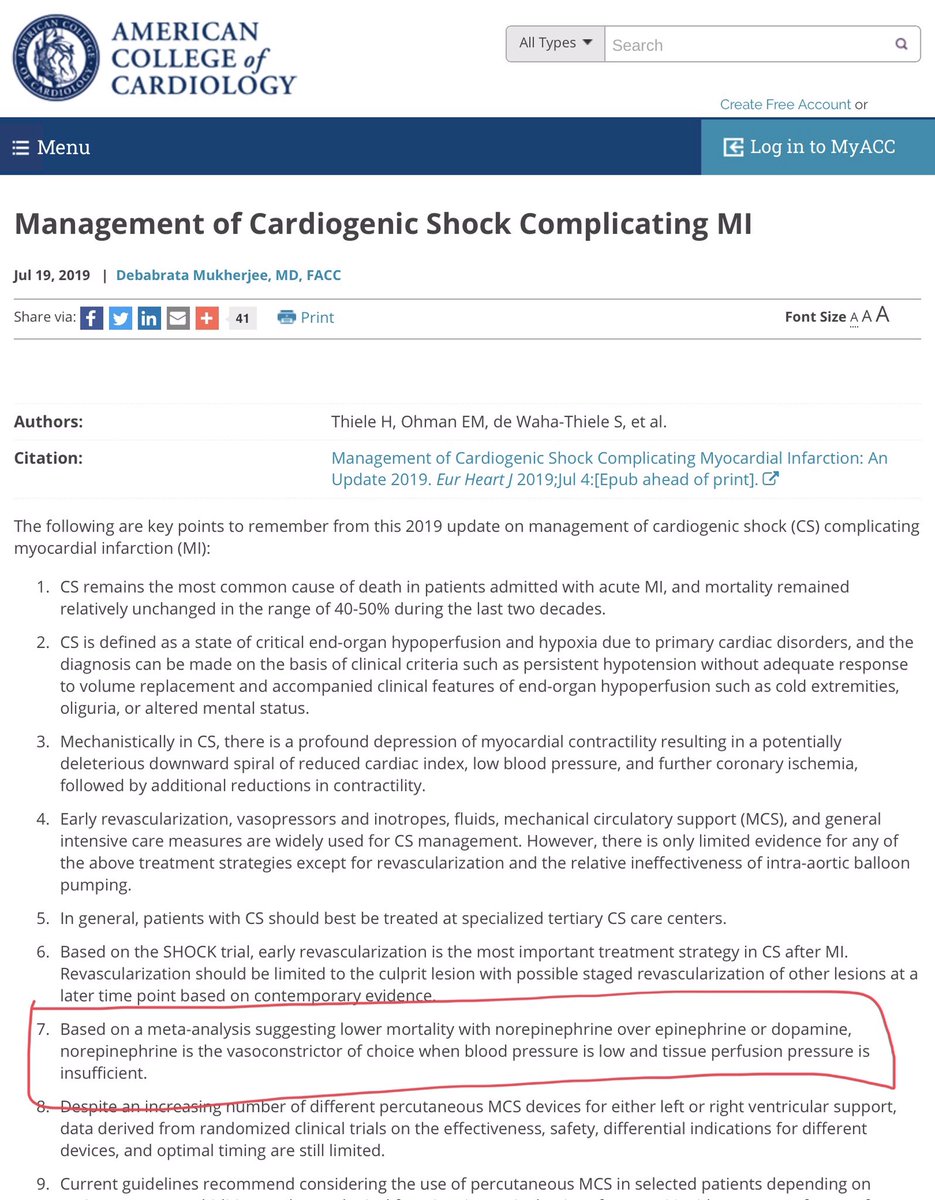My mentor taught me about shock using a dinosaur.
I won’t share the whole talk here, but the main thing I took away from his talk as an intern was IN WHAT ORDER I should think about shock as a new clinician.
1/
I won’t share the whole talk here, but the main thing I took away from his talk as an intern was IN WHAT ORDER I should think about shock as a new clinician.
1/
You’re the resident covering the ICU overnight. You’re also in charge of responding to all rapids and codes.
You’re paged to the bedside of a patient who is hypotensive.
You remember your 4 broad categories of shock.
1. Obstructive
2. Hypovolemic
3. Distributive
4. Cardiogenic
You’re paged to the bedside of a patient who is hypotensive.
You remember your 4 broad categories of shock.
1. Obstructive
2. Hypovolemic
3. Distributive
4. Cardiogenic
A systematic approach to sorting out shock can help you.
First, consider obstructive.
Why?
There are three main etioligies of obstructive shock:
- tension ptx
- tamponade
- PE
First, consider obstructive.
Why?
There are three main etioligies of obstructive shock:
- tension ptx
- tamponade
- PE
These can kill your patient quickly. They also aren’t treated with pressors, but have relatively quick fixes if you can diagnose and get things moving (drain, drain, and lyse).
Speaking of diagnosing obstructive shock, if you have an ultrasound you can get a lot of information.
Speaking of diagnosing obstructive shock, if you have an ultrasound you can get a lot of information.
Lung sliding present? Pericardial effusion? Huge, strained right heart?
From the time you arrive you can decide by history/physical/POCUS if you need to pursue further diagnostics or treatment for these etioligies within minutes.
From the time you arrive you can decide by history/physical/POCUS if you need to pursue further diagnostics or treatment for these etioligies within minutes.
Alright, let’s say you thought about obstructive for a couple minutes and you’re satisfied that that’s unlikely to be the case here. What’s next?
Hypovolemic
Usually with a little bit of history and a superficial exam you can figure this one out.
Hypovolemic
Usually with a little bit of history and a superficial exam you can figure this one out.
Is there a bunch of blood in the bed? Have they been vomiting for days?
Also not fixed by pressors.
Need to quickly figure out how to stop the loss and replace whatever is missing.
Also not fixed by pressors.
Need to quickly figure out how to stop the loss and replace whatever is missing.
Now, let’s say you’ve investigated these 2 and you’re pretty sure they aren’t the culprits.
In the MICU the remaining 2 often come together, kill you slower, can take a little more time to sort out, but are often treated somewhat similarly up front in the emergent period.
In the MICU the remaining 2 often come together, kill you slower, can take a little more time to sort out, but are often treated somewhat similarly up front in the emergent period.
Distributive shock in our world is most often sepsis (but don’t forget about anaphylaxis, neurogenic, and adrenal).
Anybody, especially any hospitalized patient, can have sepsis but you’re not going to be able to rule it out with a rapid exam and history.
Anybody, especially any hospitalized patient, can have sepsis but you’re not going to be able to rule it out with a rapid exam and history.
You, the night resident, know what to do about sepsis.
Fluids, pressors, abx while you figure out your source and control it.
Fluids, pressors, abx while you figure out your source and control it.
Last but not least, cardiogenic.
Pump failure in particular, because arrhythmia is usually easy to spot on a tele patient and we know what to do about that ( https://abs.twimg.com/emoji/v2/... draggable="false" alt="⚡️" title="Hochspannungszeichen" aria-label="Emoji: Hochspannungszeichen">).
https://abs.twimg.com/emoji/v2/... draggable="false" alt="⚡️" title="Hochspannungszeichen" aria-label="Emoji: Hochspannungszeichen">).
Pump failure in particular, because arrhythmia is usually easy to spot on a tele patient and we know what to do about that (
Patients with sepsis, especially older patients with comorbidities, will frequently have a reduced EF which is why I say these two can be hard to tease out, especially in the moment during a rapid.
POCUS is your friend again here. Take a look and get an idea of good/not great/terrible. Do your exam/history, get an EKG, decide if you need to call a heart doc.
But in the meantime, levo (because again, it’s often hard to tell cardiogenic from distributive right off the bat).
But in the meantime, levo (because again, it’s often hard to tell cardiogenic from distributive right off the bat).
So to recap—
Shock is common, and as a resident you WILL be managing undifferentiated shock.
Have a systematic approach.
1. Obstructive
- It’s bad
- POCUS helps
- Quickish fixes
Shock is common, and as a resident you WILL be managing undifferentiated shock.
Have a systematic approach.
1. Obstructive
- It’s bad
- POCUS helps
- Quickish fixes
2. Hypovolemic
- A little history helps a lot
- Stop the loss
- Replace what’s missing
Now consider starting some fluids/pressors and thinking if you need to.
3. Distributive
- Can almost always be sepsis
- You know what to do while you investigate
- A little history helps a lot
- Stop the loss
- Replace what’s missing
Now consider starting some fluids/pressors and thinking if you need to.
3. Distributive
- Can almost always be sepsis
- You know what to do while you investigate
4. Cardiogenic (pump failure)
- Can coexist with others
- Don’t miss it because you found something else first
- Figure out if you need to call a cardiologist
- Levo is usually reasonable acutely while you sort things out
- Can coexist with others
- Don’t miss it because you found something else first
- Figure out if you need to call a cardiologist
- Levo is usually reasonable acutely while you sort things out
I realize this is pretty basic, but the framework has helped me find surprise big PEs, pneumos, tamponade, and manage other undifferentiated shock in the moment for almost four years now.
Maybe it’ll help you, too.
Maybe it’ll help you, too.
Re: the dino  https://abs.twimg.com/emoji/v2/... draggable="false" alt="🦖" title="T-Rex" aria-label="Emoji: T-Rex">
https://abs.twimg.com/emoji/v2/... draggable="false" alt="🦖" title="T-Rex" aria-label="Emoji: T-Rex">
https://twitter.com/emily_fri/status/1280681147098423300?s=21">https://twitter.com/emily_fri... https://twitter.com/emily_fri/status/1280681147098423300">https://twitter.com/emily_fri...
https://twitter.com/emily_fri/status/1280681147098423300?s=21">https://twitter.com/emily_fri... https://twitter.com/emily_fri/status/1280681147098423300">https://twitter.com/emily_fri...

 Read on Twitter
Read on Twitter



